
Genesis G80 Sport 2022 Review

Introduction
If you're unfamiliar with Genesis, it's the luxury arm of Hyundai.
Many brands are doing the same nowadays. Even Volvo, despite working its way into contention with its superbly designed cars, has an off-shoot called Polestar. However, in fairness, that's more a luxury all-electric marque designed to rival Tesla.
Nevertheless, middle-of-the-pack manufacturers like Hyundai, who know they’ll never turn the public opinion of its brands into line with Mercedes-Benz, BMW and Audi, have come up with the next best thing: invent a new marque. One that's got a clean slate.
It has worked quite well for some so far, with Genesis producing a raft of cars which, on the surface, look amazingly opulent.
Here, we’re looking at its big saloon: the G80 – in the new Sport Line – or Sport, as Genesis prefers us to call it, trim.
Select's rating score* - 4.3 / 5
At A Glance
It looks gorgeous and, at first glance, easily looks like a viable adversary for the Audi A7 Sportback, Mercedes-Benz CLS and BMW 5 Series.
The front has Genesis’ huge design signature – its Bentley-inspired grille – only distinguished from the ultra-luxury brand by a pointed shape at the bottom.
As is also part of the Genesis styling language, there are two horizontal strips for the lights on each side.
The Sport Line model also has a mesh lower grille, which is shaped by the bodywork, creating what looks like a large air intake on each side, while other models get a lower grille mesh which is more bowtie-like in appearance.
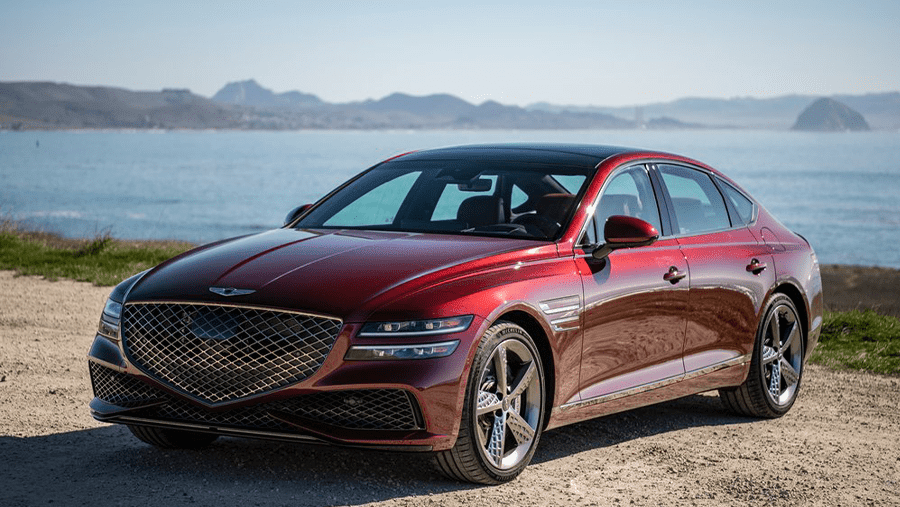
Along the sides, fenders marry up with the lines of the headlights, the sides bulge out towards the rear, and meaty side skirts give it even more presence, not that the G80 appeared to lack it in the first place.
There is a coupe-ish slope to the rear window, giving it the armadillo-shaped profile of a Mercedes-Benz CLS.
The rear also features a couple of horizontal lights on each side, two large exhaust tips, shaped as per the front grille, and the word 'GENESIS’ spelt out on large letters along the boot lid, with some air intake-like slits lower down on the Sport version.
From all angles, it’s a real head-turner – and that’s typical of the Genesis style.

Key Features
All models come well-equipped, with a trio of trims on offer.
The entry-level Premium gets 19-inch alloys, a 14.5-inch infotainment touchscreen with SatNav, Apple CarPlay, Android Auto, DAB radio and voice recognition. It also boasts an eight-inch digital instrument cluster, electronic control suspension, dual front LED headlamps, a black high glossy interior finish, smart cruise control and a stop/start function. Phew! You also get 12-way electric front seats, with four-way powered lumbar support, plus keyless entry with button start.
The mid-range Luxury trim upgrades to 20-inch rims and adds a heated steering wheel, leatherette dashboard, quilting on the seats, a natural wood interior finish, powered tailgate, three-zone climate control and a premium air filter.
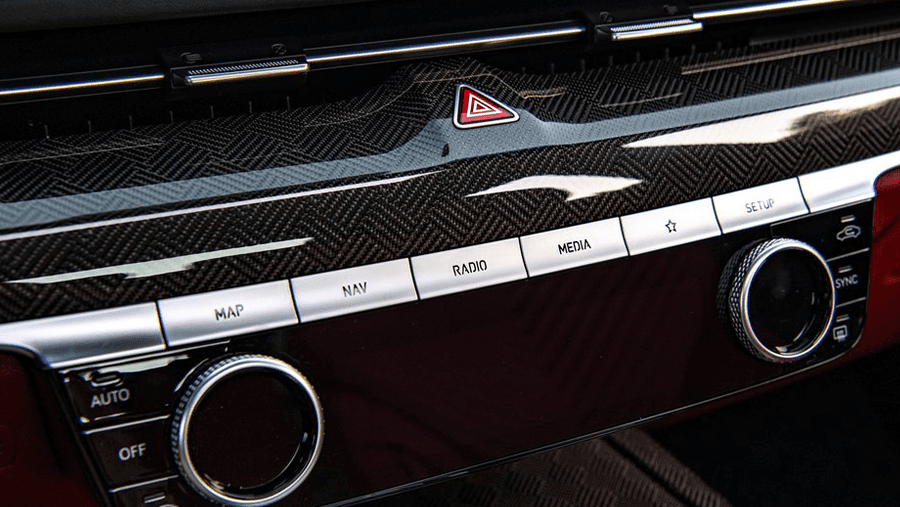
The new top-of-the-range Sport Line trim, reviewed here, gets 19-inch alloys but adds a carbon interior finish, black brake callipers, metal pedals, a leather heated steering wheel and Nappa leather seat covers.
There is only one combustion engine offered: a 2.5-litre four-cylinder turbocharged petrol engine with 308PS and an eight-speed automatic gearbox.
All variants come with rear-wheel drive or all-wheel drive.
There used to be a 2.2-litre diesel with about 210PS and rear-wheel drive, but this has been discontinued.

Performance & Drive
We are test-driving the top-of-the-range Sport model with all-wheel drive.
The petrol powerplant pulls away well, with plenty of grip to help to get you from 0-62mph in 6.0 seconds flat.
It is a big and heavy car, though, weighing in at a little under two tonnes, so it can be a little slow to respond when you want to get moving. It is certainly not poor, but there is a sense that you need to thrash the G80 Sport to get the performance out of it.
A bigger engine might be preferable here, but many performance cars are coping fine with 2.5 litres or less nowadays. Genesis is unlikely to want to sacrifice fuel economy more than it needs to.
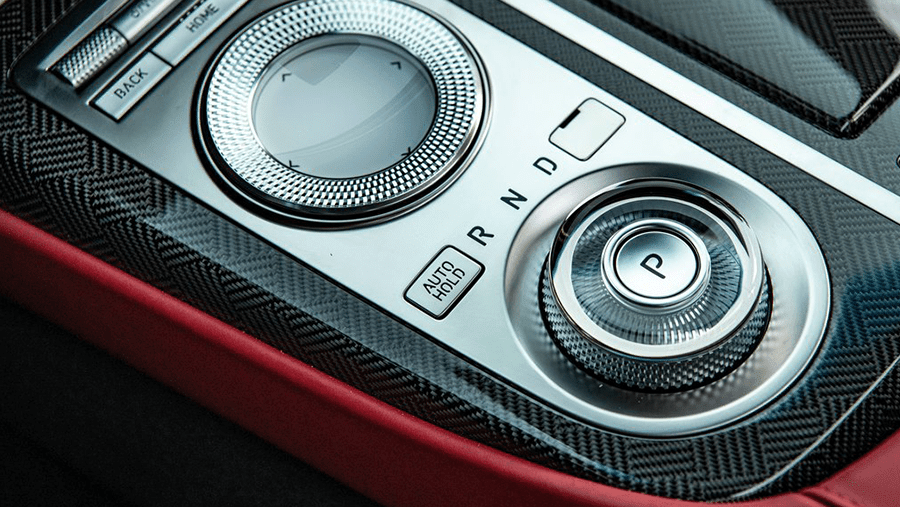
What it comes down to is that the likes of BMW and Audi have very well-refined engines that can get substantially more power out of smaller engines on a level that Genesis and its parent company, Hyundai, can't match.
The eight-speed automatic changes gear smoothly but is not exceptionally responsive when changing down after you floor the throttle. At the same time, the paddle shifters don't add anything and seem to overcomplicate matters.
The G80 Sport is more at home on a motorway cruising at 70mph, where it handles things in a relaxed, calm manner, helped by the double-glazing on the front windows.
The same is true of the ride comfort, too. It is fine on motorways and dual carriageways, but along slower, less well-maintained roads, the suspension is a little firm when dealing with lumps and bumps.

Nevertheless, the Genesis isn't uncomfortable by any means, and its electronic control suspension helps to smooth things out, scanning the road ahead to adjust itself to deal with whatever lies in front of it. However, it's still no match for a BMW 5-Series.
We would probably avoid the mid-range Luxury trim on its 20-inch alloys, which seems excessive – and you can't downgrade to 19 inches.
Surprisingly, the flagship model gets smaller 19-inch wheels, especially as it's the Sport trim. But it's probably a good thing here, although if you must have the enormous rims available, you do have the option to upgrade.
Around corners, it’s about what you’d expect from a large luxury saloon car. The grip is impressive, and it’s adept at changing direction. But the sheer weight and long wheelbase mean there's a tendency to understeer on corner entry and oversteer on exit if you push it too hard.

The steering is incredibly light, too, and doesn’t really weight up in the bends, which doesn’t help, but then it's not a vehicle designed for its handling prowess.
Not only is soundproofing provided by the double-glazing, but there’s also active noise-cancellation technology in the G80 Sport’s cabin. This adds more evidence to the argument that this is a long-distance cruiser designed for wafting along.
Overall, the Genesis G80 Sport’s performance certainly isn't bad. It just isn't entirely on the level of the premium brands.
However, given this car appears to be about luxury and creature comforts, it's a fair argument to say that its inferior performance and handling aren't relevant.

Running Costs & Emissions
The all-wheel-drive test car claims it'll do 30.5 to 31.2mpg, which isn't bad for a 2.5-litre engine attached to a nearly two-tonne vehicle.
It produces 205g/km of CO2, though.
The rear-wheel drive version fairs slightly better, as we’d expect, managing 32.9 to 33.9mpg, emitting 189g/km of CO2.
But suppose fuel saving is the aim of your game. In that case, Genesis’ decision to withdraw the G80’s diesel engine is a shame, especially when all its rivals continue to offer more economical versions of their motors.
But there is an all-electric version – the Electrified G80, to give it its official name – which will appeal more to company car users looking to save on Benefit in Kind tax.
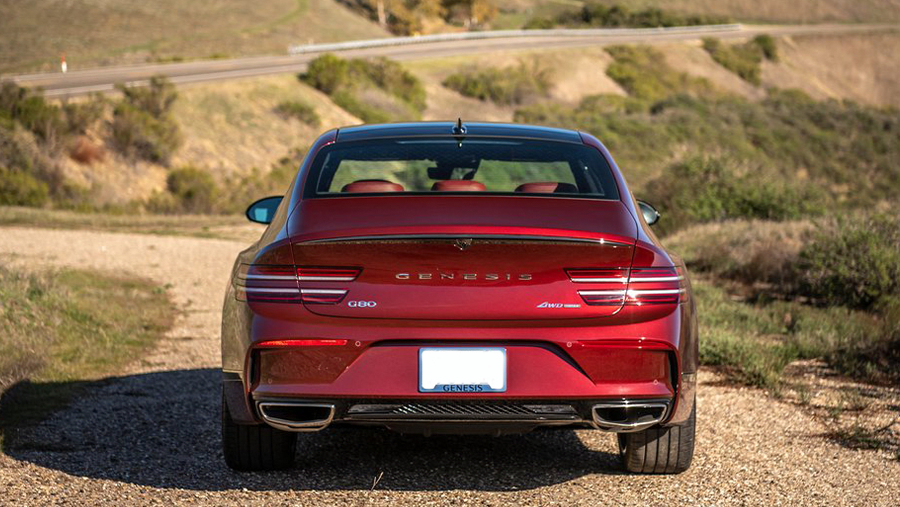
One thing to remember is that, unlike its challengers, Genesis offers a comprehensive aftersales support service. This might not seem relevant, seeing as you’re leasing this car, but it’s worth us mentioning it here, as we’re here to inform you, after all. It includes a five-year unlimited-mileage warranty as standard – and it has Hyundai engineering behind it, which is way ahead of its German competitors regarding reliability.
You also get five years’ roadside assistance and servicing - and it’s door-to-door, so Genesis collects your car, takes it away, does what’s needed and delivers it back to you at the end of the day.
This is all organised through a personal assistant, who is allocated to you.
While the G80 may lack in some areas, Genesis as a company is challenging to beat regarding customer service.

Interior & Technology
The G80 Sport’s interior is as impressive as the exterior, appearing luxurious and opulent.
The test car featured cream and black dual-coloured upholstery, but there’s a choice of other colour combinations, which vary depending on which trim you choose.
The steering wheel is invitingly thick, with plenty of buttons and silver trim. At the same time, there's plenty more silver garnish on the indicator stalks, the paddle shifters, the dashboard, and the centre console.
The 14.5-inch touchscreen sprouts up from the centre of the dashboard. However, while it sounds big, its size is more in width – it's much broader than it is tall – far more so in proportion to, say, a widescreen TV.
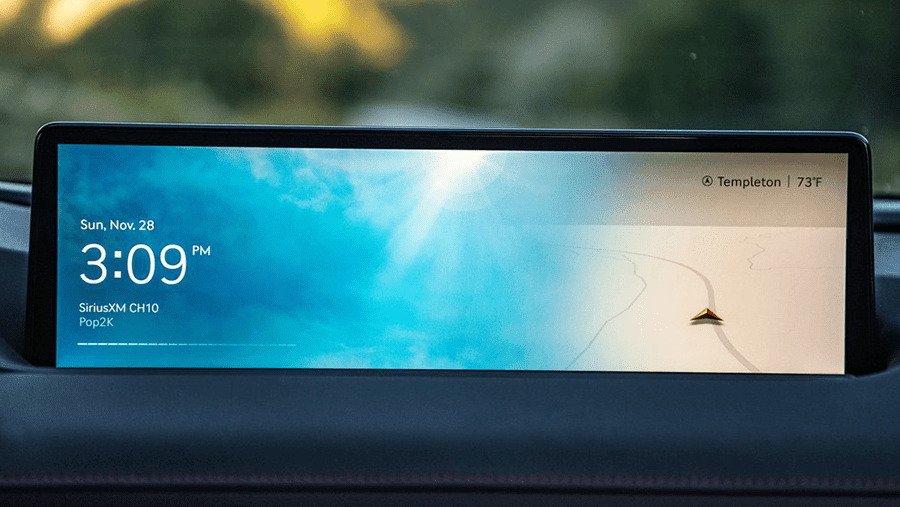
Nevertheless, it’s functional and reasonably intuitive, with straightforward menus, a clear display and a responsive screen.
Like the G80 Sport’s performance on the road, it's alright but not a match for BMW's iDrive system.
Thankfully, physical buttons and dials are retained for the climate control system, with a digital display in the centre of each dial which handily displays the current temperature setting.
Overall, the G80 Sport’s interior looks solid and well-built, plus it’s sensibly thought out.
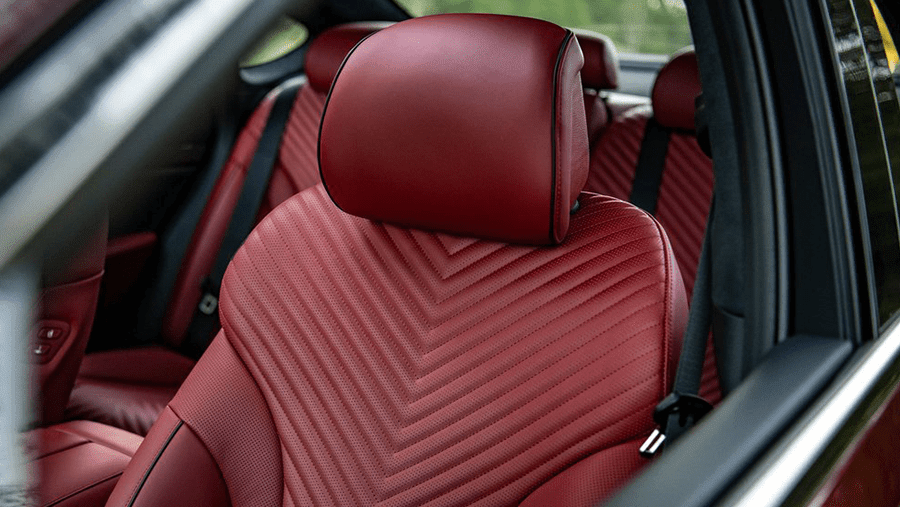
Practicality & Boot Space
Finding a comfortable driving position is as simple as can be in the G80 Sport, thanks to the fully electric front seats, lumbar support, and the cabin's spaciousness.
There is a considerate amount of headroom, too. But taller drivers will find it’s getting a little close for comfort if they sit higher up and have the optional panoramic sunroof.
You will get three adults in the rear, but it’s still a little bit of a squash, plus the middle seat has a hump in it, so you’ll be sitting higher up.
Two adults will fit with relative ease, with a good amount of leg and headroom, the latter, despite the sloping roofline, thanks to the car’s coupe-like shape.
The boot isn't massive at 424 litres, over 100 litres less than the BMW 5-Series and Mercedes' E-Class offer.
Genesis doesn't provide a figure with the rear seats down. Still, they can fold in a convenient and versatile 40:20:40 configuration – and will do so electrically as part of an optional extra.
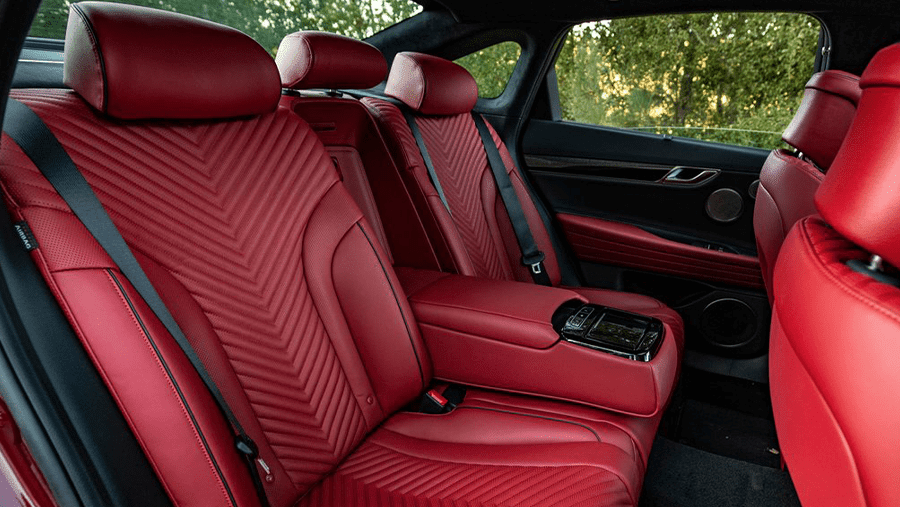
Safety
The Genesis G80 was put through its paces by crash-testing body Euro NCAP in 2021, earning a five-star rating.
It scored 91 per cent for adult occupants, 87 per cent for children and 91 per cent for safety assists.
All G80 models come with a raft of driver assistance systems, including lane following assist, blind-spot collision avoidance assist, and rear cross-traffic collision avoidance assist. You also get highway driving assist and a rear-view camera with dynamic guidelines.
An Innovation Pack can be added as an optional extra. This bundle includes lane change assist, upgraded highway driving assist, forward collision avoidance assist, and an upgraded emergency braking system. It also adds a blind spot view monitor, reverse collision avoidance assist, remote smart parking assist, and surround view monitor.

Options
There is no shortage of optional extras to tempt you into spending even more money.
If you want the car to be anything other than solid white, then you’ll have to pay extra, with solid silver offered as an alternative, while metallic colours include black, white, silver, dark blue, red, a bluey-black, bright blue, dark red, and very dark grey.
There are also two matte paint colours: very dark grey and silver, although these aren't available on the entry-level Premium trim, while some of the above colours are only available on the Sport trim.
The Luxury trim has three exclusive colours: dark gold, dark green and brown.

Only the Sport trim has the option to change the size of the wheels, which are 19 inches by default, with 20-inch rims available for a few hundred pounds. However, it’ll cost half as much again on top if you want those wheels with red brake callipers.
For the interior upholstery, the Premium trim gets a choice of black or a dual-coloured brown, which adds flashes of lighter brown on the seats and dashboard, but darker brown around the steering wheel and on the doors.
It is the same in the Luxury grade, which also gets a third option of dark blue and dark brown, along with five other Nappa leather colour options.
The Sport trim, which we’re interested in here, gets Nappa leather as standard, with black, creamy beige and dark grey. Black and dark red is offered, too, while you can also choose the pattern of the carbon weaving on the interior trim.

The Innovation Pack adds a 12.3-inch 3D digital instrument cluster, a head-up display and a host of safety systems we mentioned earlier.
The panoramic sunroof we covered a little while ago is on the list, too. At the same time, the Comfort Seat Pack adds a host of upgrades, including side bolsters and ventilated seats in the front, electric steering wheel adjustment and memory function.
Choosing this also unlocks the Executive Pack, which adds tilt and recline adjustment for the back seats, provides remote controls for them, and gives you rear curtains, adding in heated and ventilated seats in both the front and back, plus a rear wireless phone charger.
There is also a Lexicon Premium Sound System, which includes 21 speakers. We previously thought having that many were only possible on a coach!

Rival Cars
Obvious rivals include the BMW 5 Series, the Mercedes-Benz CLS and E-Class, the Audi A6 and A7 Sportback, plus the Volvo S90. Meanwhile the Jaguar XF is possibly also worth considering, along with the even better Lexus ES.
All cars offer slightly superior refinement over the Genesis in almost every area, including powertrains, handling, and practicality. Few, if any, are likely to be as exclusive as the Genesis, though. And in terms of which one will get the most attention, the G80 Sport is the only true head-turner among them.

While the G80 is an attractive price at entry-level, Sport trim, which we’re testing, adds a significant amount to the cost, and that means several combinations of the BMW 5 Series are cheaper, although the price shoots up if you want as much power as you get in the G80.
An Audi A6 Sport 45 TFSI, with 265PS, is around 10 per cent cheaper at list price than the G80 Sport but has an identical 0-62mph time – and that sums things up rather nicely.

Verdict & Next Steps
Overall, the Genesis G80 Sport is a superbly attractive car, offering sophistication and splendour by the bucket load.
It is very well equipped, especially regarding safety systems, and the interior is as lovely to sit in as the exterior is to admire through your living room window.
Despite over 300PS, the engine feels a bit restrained, and the handling is hardly athletic. But then the G80 is about anything but performance, so it isn’t as relevant a criticism as it would be with, say, a hot hatch.
Regarding fuel economy, withdrawing the diesel engines from the range means those who want lower running costs will have to fork out substantially more upfront for the Electrified version.
The car does look nicer in Sport trim. Still, there's little reason to spend so much extra, so leasing the entry-level Premium trim gets you all the essential equipment and lowers the price, which may be preferable to those wanting a break from the typical European rivals.
We can’t deny that those German competitors provide the biggest reason to avoid the G80 Sport – they are just on a level that the Genesis can’t quite match. But we also have to question whether that matters in a car like this.
Where to next?
View our latest Genesis G80 Leasing Deals - from just £522.06 per month inc VAT**
Looking for a great leasing deal? Check out our incredible range of Special Offers
New Saloon? Read our latest Car Reviews and find the right model for you
Want to know more about leasing? Take a look at our comprehensive Leasing Guides
Interested in everything motoring? Why not catch up on all the latest Car Leasing News.
*Score based on Select’s unique meta score analysis, taking into account the UK’s top five leading independent car website reviews of the Genesis G80
**Correct as of 29/11/2022. Based on 9 months initial payment, 5,000 miles over a 48 month lease. Initial payment equivalent to 9 monthly payments or £4,698.54 Ts and Cs apply. Credit is subject to status.





















